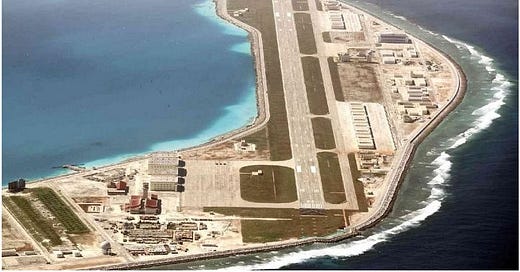By: B A Hamzah
With the international press largely concentrating on the G20 meeting in Bali at the start of this week, little notice has been taken of China once again stealing the show at the Asean Summit at Phnom Penh last week.
Beijing’s ability to influence regional events is significant as it dangles more economic goodies for the region. Besides announcing new funding for several infrastructure projects in Laos, Cambodia, Thailand, and Indonesia, Beijing succeeded in delaying one of Asean’s major external policies in the South China Sea by influencing the decision to forestall what it finds objectionable.
The Asean member states have been pushing for a treaty to regulate the conduct of parties in the South China Sea for the past 20 years. The proposed treaty, known formally as the Declaration on the Conduct of Parties in the South China Sea, or colloquially as the DOC, was first mooted by late President Fidel Ramos of the Philippines after China seized the Mischief Reef in 1995, which Filipino fishermen used as shelter during the rainy season. Mischief Reef is 250 km. from the Philippine island of Palawan and 3100 km from the nearest Chinese territory.
The code of conduct became an Asean-wide program to engage and regulate the behavior of Chinese nationals. China, however, has been assertive in the South China Sea since it occupied the Paracels in 1974. Under pressure from the united Asean countries China agreed to an informal mechanism that would regulate the activities of all contesting parties. Despite that, Beijing has only given lip service to the idea of converting the declaration into a binding treaty that would restrain its activities within the disputed nine-dash line boundary drawn by the Nationalist Government in 1947.
The informal DOC has not stopped China from occupying features in the Spratlys. By 2012, China has built and fortified seven underwater features into military garrisons despite objections from other claimant states and major maritime powers including Japan and the US. Beijing has also occupied other features like the Scarborough Reef that President Barrack Obama once vainly called a red line not to be crossed.
Washington considers the Chinese military outposts to be illegal under international law. Although the US position on China’s claims in the SCS is consistent with 2016 findings of the International Tribunal at the Hague at the behest of the Philippine government, China shunned the Tribunal proceedings and rejected the findings. The Tribunal was set up at the request of the Philippines in 2013 to determine the legitimacy of China’s historical claim in the South China Sea although the former Philippine president, Rodrigo Duterte, weakened his nation’s position by downplaying the decision.
The US has accused China of violating the United Nations Convention on the Law of the Sea (UNCLOS), which Washington has yet to ratify despite the multilateral treaty coming into force in 1996. UNCLOS is considered the mother of all maritime treaties and a constitution for the ocean and its resources. UNCLOS also provides the international community with an effective legal framework and rules for ocean governance and for maintaining law and order at sea.
Tensions have been building up in the sea between some claimant states and China since Beijing seized the Paracel islands from South Vietnamese troops in 1974. In 1979, China went to war with Vietnam over the expulsion of mainly Chinese minorities in what then was South Vietnam. In 1988, the Chinese and Vietnamese navies clashed over a maritime feature known as Johnson South Reef. More recently, the PLA Navy and other agencies including maritime militia have been harassing fishing boats and vessels belonging to Vietnam, the Philippines, and Malaysia on contract with foreign oil companies, for example.
A joint statement was issued to commemorate the 20th anniversary of the DOC at last week’s Asean summit at Cambodia in lieu of a treaty, a regurgitation of very broad general policies that both sides have agreed in the past 20 years. Despite promising the Asean members that it would do its best to speed up ratifying the DOC, China is no longer willing to commit the points into a treaty presumably for the following reasons:
One. China does not want a legally binding document that could hold it responsible and accountable for any breach.
Two. China believes the proposed treaty could not mitigate the tensions at sea involving external powers like the US, Japan, Australia, and others. The treaty, according to one Chinese policymaker, would not solve tensions with the US and its allies.
Three. China believes its ownership of the area within the nine-dash line is incontestable. It could do what it likes in its own territory.
Four. China fears the treaty could be used by other stakeholders (read US and allies) plying the SCS and the airspace over it to demand for similar privileges.
Five. China knows that the Asean states that have been demanding the passage of this treaty are too weak states to harm China’s security.
This is not the first time in Asean history that Cambodia did not play ball. While occupying the Asean chairmanship in 2012 and 2016, the Phnom Penh Government has twice prevented the Asean Foreign Ministers from issuing joint statements that would condemn China’s assertive activities in the South China Sea.
All eyes are now on Indonesia, which assumes the Chairmanship of Asean in 2023. Can Indonesia succeed where other members have failed for that two decades to break the DOC jinx? Personally, I doubt whether President Widodo Jokowi, who will be leaving office in 2024, is willing to break diplomatic relations with China over a document that over the years has lost its diplomatic value. Moreover, evidently, the so-called Asean’s consensus over the document has also eroded in importance as China becomes stronger militarily and wealthier.




Need to look back at ROC declaration of 11 dotted lines in 1947 by Generalissimo Chiang Kai Shek. USA, GB and France controlling Philippines, Malaya/North Borneo/Sarawak and IndoChina respectively did not distinctly rejected the claim.